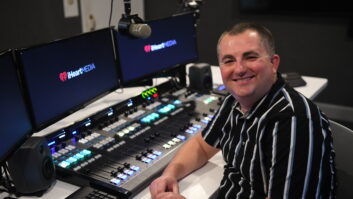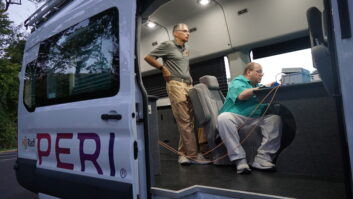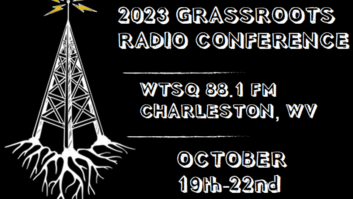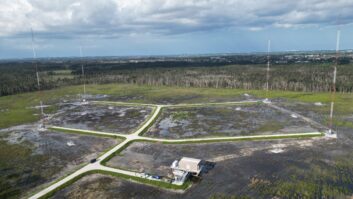When Ruth Gaviria came to Entercom last year as chief marketing officer, she arrived with a corporate background that included stints at Procter & Gamble, Colgate Palmolive and Time Inc. and a media background that included Meredith Corporation’s Hispanic-targeted magazines and Univision television and radio. Within a few months of her arrival, her new job grew considerably with the announcement of the company’s impending acquisition of CBS Radio’s portfolio of major-market stations.

Ruth Gaviria. “We want to be a champion for the radio industry, we are poised to continue to connect with local communities and build our enterprise in that way.”
Until that deal closes, Gaviria can’t talk about any of Entercom’s specific plans for those signals and those new markets. But she spoke to Radio World this spring about what the company is doing and how she and Entercom CEO David Field see the future of the radio business.
Radio World: What’s the message Entercom is sending to the radio industry right now?
Gaviria: It’s a very optimistic message. We believe in the power of radio. It has the opportunity and ability to connect brands with fans. It’s a growing medium, the least disruptive medium. It’s evolved as the number-one reach medium. We reach 240 million people a month, which is really amazing. We are really bullish about radio.
RW: David Field has been traveling the country to visit Entercom’s local markets. What are some of the things he’s seeing? What’s he picking up on his visits?
Gaviria: Our business model is about local marketing, so local is at the core of everything we do. The listener is at the center of our business model. So our investment in local personalities, local brands, the events that connect communities and help them thrive is really the core business model that we have. David and [Chief Operating Officer] Weezie Kramer going around to local markets, they’re even more optimistic about the power of local connections and how brands can benefit from that. When you start looking at a media-mix model, and when you look at the power of each medium, and when you look at automotive for example, you see the importance of media that has a day in, day out relationship with the consumer and that can translate that relationship to a brand. So for us, it’s an incredible time. I also think that as you look at advertisers, there’s a renewed commitment to mass media, there’s renewed commitment to the massive scale that radio has, and in our case the local connection we can provide.
RW: What will it mean to add CBS Radio’s stations and markets to that mix?
Gaviria: I can only speak to my life right now, to what Entercom is right now. We are continuing to invest in local relentessly. What does that mean? We continue to do the research, to ensure we have the best local personalities, and continue to work collaboratively in each of the markets to make sure we offer multi-market plays and national plays. I can see the opportunity of what this can be, but for right now what I’m focused on is how I can serve my advertisers and my listeners today.
RW: For several groups, event promotion has become a big part of their business model. What does it mean for Entercom?
Gaviria: Entercom produces 4,000 events a year, and it’s from small farm-to-table events or custom-crafted events to massive events where we have audiences of 10,000 and more like Riptide [Music Festival] in Miami or Pain in the Grass in Seattle. Events are parts and parcel of the connectivity we have with the community. It’s an integrated play, right? So from a consumer perspective, we want to make sure our that local brand is touching that consumer ��360.” Events and digital are part of that conversation.
The inflection point is, the radio brand and the on-air personalities that have that relationship, how do you extend that? We extend it through events that make sense organically. One of the things you’ll see Entercom doing is custom local events. We do not have that cookie-cutter, all events are named one thing. When an advertiser comes to us, we say, “We can give you access to that consumer, but it’s going to look a little different in each market.” Because we want to make sure that we are really connecting with that audience. So it’s a major part of this business and something we want to continue to grow. And it’s fun! Come on, radio is fun!
RW: Let’s talk about that fun part, because that sometimes gets lost, especially in groups that don’t have a lot of local personality to work off of. How important is it to keep that feeling of excitement going in the business?
Gaviria: You’re talking my language. Radio reaches 92 percent of millennials, 95 percent of Generation X. If we weren’t cool and fun, we wouldn’t be reaching that many. Ninety-two percent translates to 67 million millennials. The way we do that is music discovery — we are committed to new artists, to new music. Bacon and bourbon events, that’s fun, right? We are launching a new beer in one of our markets. We’re able to have that agility, to have that kind of connectivity to consumers to be able to respond, to take risks in the right places. That’s a super millennial thing, and it’s super fun. And I think that’s part of what radio can offer, and one of the reasons radio keeps young, because of the audience it serves and because we have the ability to do so many fun things.
RW: What about the role of digital media? Where are the digital plays right now, and what is some of the non-traditional revenue you can generate in that space?
Gaviria: Digital is an imperative, and the new reality is that we have to have integrated enterprise, and we do.
What we’ve done is to ensure each of our broadcast brands has its own digital frame. The inception point of content and the inception point of relationship is the broadcast, but then we continue that conversation on digital, on social, on podcast, and also on loyalty programs. So on a weekly basis, for example, across our footprint we have 55 million shares a week. We have over 10 million monthly listening hours on streams. We also have 12 million podcast downloads a month. And we are able to offer that to advertisers. I don’t think there is any longer just a discrete broadcast play, there is an integrated play.
But you need to make sure you have permission from that and you need to make sure digital delivers, that it’s something that actually doubles down and delivers. So we are very committed to having a completely integrated enterprise. And we are very listener-led. Listeners want to continue this conversation on digital, it’s really a mobile platform. And it needs to be digital, and we are.
RW: How did you get into radio?
Gaviria: I worked at Univision, and that enterprise was very TV-focused. But we did have a radio piece, and we had an opportunity to rebrand radio and integrate radio into the full picture of how we touched consumers. I got recruited into radio.
At the time, I didn’t really understand Entercom’s play. I call Entercom the hidden gem, a hidden brand about to be not so hidden. In talking to David and hearing his vision, for me it was serving local communities and that what we do matters. And when you have a values-driven and a mission-driven company, where the CEO is committed to serving communities. One day a quarter, we’re allowed to fundraise for anything that we think makes sense for the community. You have to find meaning in your job, and it’s very meaningful for what we can provide to the community and by default be able to provide to advertisers. I got hooked! And then you go to a few concerts, you go to “Bourbon and Bacon” in Denver, you go to Miami for Riptide, it’s not a bad job!
RW: While you can’t talk about the details of your plans for CBS Radio, it’s been publicly announced that the merged company will keep the Entercom name. Will we be seeing a higher profile for Entercom in the industry?
Gaviria: From a business-to-business perspective, absolutely. We made the decision, David has shared that this will be “Entercom.” I know we will be much more vocal as a business enterprise, representing the value of radio, stepping up to the plate in terms of how to educate advertisers on what radio can do, investing in the marketing of radio, investing in research, in radio impact studies, so that we have a balanced message out there, so that advertisers can make a decision to include radio as part of the mix.
We want to be a champion for the radio industry, we are poised to continue to connect with local communities and build our enterprise in that way. I think radio is going to be important to the vitality of the media industry. We need to offer advertisers an easier way to participate in events and have this 360 experience. It’s really about experiential marketing, and when you harness the power of radio, you harness the consumer in a way that you can get more share of mind.












